China After Empire: 1911 Remembered, Harvard University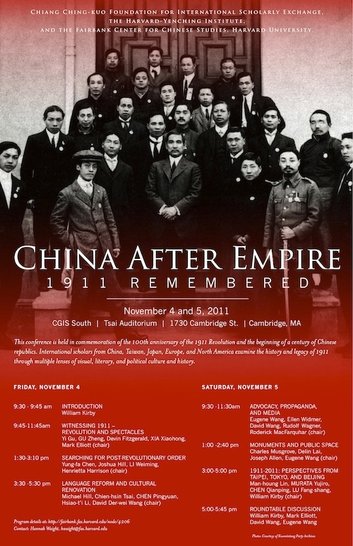 On November 3-5, the international conference “China After Empire: 1911 Remembered” was held at Harvard University. Organized in commemoration of the 100th anniversary of the Xinhai Revolution that ended the Qing Dynasty, this conference brought together leading scholars in a variety of disciplines both to situate the momentous event in the historical trajectory as well as to rethink its legacy in terms of global politics, language, art, and culture. Scholars from across the United States, Mainland China, Taiwan, Hong Kong, and Japan presented 18 papers in 6 panels, and each presentation was followed by a lively discussion period with the audience. The conference concluded with a roundtable discussion with conference organizers William Kirby, Mark Elliott, David Der-wei Wang, and Eugene Wang. This cross-cultural, multidisciplinary conference, cosponsored by CCK-IUC, the Fairbank Center for Chinese Studies, and the Harvard-Yenching Institute, opened up many avenues of interesting thought and debate related to the 1911 Revolution. A panel at the international conference “China After Empire: 1911 Remembered,” held at Harvard University November 4-5. Participants of the international conference “China After Empire: 1911 Remembered.” Literature and Redemption: A Conversation with Authors Su Tong and Xu Xiaobin, Harvard University
Professor David Der-wei Wang moderates the lively discussion with the authors Su Tong and Xu Xiaobin on November 1. Readymade: A Documentary about Mao Impersonatorswith the Director Zhang Bingjian, Harvard University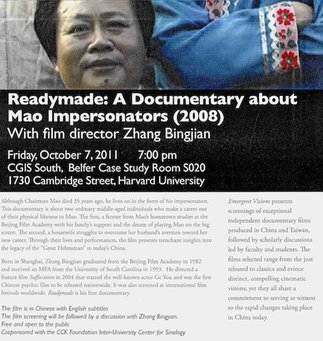 At Harvard University on October 7, artist and filmmaker Zhang Bingjian presented his film Readymade: A Documentary about Mao Impersonators and answered questions from the audience. This documentary is about two ordinary middle-aged individuals who make a career out of their physical likeness to Mao. The first, a farmer from near Mao’s hometown studies at the Beijing Film Academy with his family’s support and the dream of playing Mao on the big screen. The second, a housewife, struggles to overcome her husband’s aversion toward her new career. Through their lives and performances, the film presents trenchant insights into the legacy of the “Great Helmsman” in today’s China. About 80 people attended the screening, while the question and answer session focused on the film’s production process and the government’s reaction to these amateur Mao impersonators. This event was sponsored by CCK-IUC. Early China Seminar, Columbia University On October 1, the Early China Seminar entered its ninth year with a fully-loaded program of ten distinguished speakers for 2011-2012. The first meeting featured two unique paper presentations: “The Transition from Immanent to Transcendent: Situating Religion in the Xing zi mingchu 性自命出 between the Analects and the Daode jing” by Kenneth Holloway of Florida Atlantic University, discussed the religious implications of this new text from Guodian; and “The Baseness of Knights Truly Runs Deep: The Crisis and Negotiation of Aristocratic Status in the Warring States,” in which Andrew Myer of Brooklyn College introduced a new approach to the concept of shi 士 not as a fixed social class, but as a status that under constant debate and negotiation in the Warring States period. The two papers each illustrate significant points in early Chinese intellectual history, and were warmly discussed by an enthusiastic crowd of scholars and graduate students from New York and neighboring areas. With the scheduled publication of the seminar special volume, Writing and Literacy in Early China: Studies from the Columbia Early China Seminar (University of Washington Press, November 2011), and with Professors Li Feng (Columbia University) and David Pankenier (Lehigh University) as the group’s new co-chairs, the Early China Seminar enters an exciting stage of its history. Participants of the October 1,2011 meeting of the Early China Seminar at Columbia University. A Poet in Exile: A Dialogue with Liao Yiwu 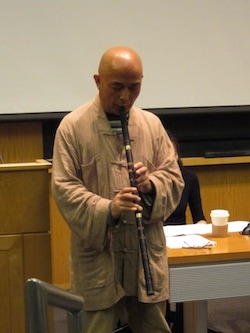 Poet Liao Yiwu plays a wooden flute. Poet Liao Yiwu plays a wooden flute. A special lecture by distinguished poet and writer Liao Yiwu was held in the Tsai Auditorium at Harvard University on September 20, 2011. The auditorium was packed with an audience of over 150 people including senior China specialists, graduate students, visiting scholars from the PRC and Taiwan, as well as the general public. In this public conversation, Professor David Der-wei Wang and Professor Merle Goldman had an engaging dialogue with Liao Yiwu covering a wide range of topics from politics and literature, to history and the arts, and finally to the broader question on the role of the public intellectual in China and overseas. Dr. Jie Li served as translator, while Dr. Rowena He moderated the event. In addition to a robust dialogue and far reaching intellectual conversations, Liao played flute at the beginning of his talk, and recited his famous poem “Massacre,” dedicated to those killed on June 4, 1989, after a question and answer session at the end. This event was co-sponsored by CCK-IUC and the Fairbank Center for Chinese Studies. “A Poet in Exile,” held on September 20 at Harvard University, featured (from left to right) Dr. Rowena He, Professor Merle Goldman, the poet Liao Yiwu, Dr. Jie Li, and Professor David Der-wei Wang. The Tenth Annual Junior Scholars Conference on Sinology, University of California, San DiegoThe Tenth International Junior Scholars on Sinology was held between August 15 and 18, 2011, on the campus of the University of California, San Diego. Organized by Professor David Der-wei Wang of Harvard University and Professor Ping-hui Liao of The University of California, San Diego, the theme of this year’s conference was “Taiwan as Hub of Transculturation.” Eighteen doctoral candidates or recent graduates presented papers and engaged in quite lively discussions in a variety of topics. The papers covered six research areas: literary and cultural studies, film studies, art history, ethnic studies, gender and queer studies, and religious studies. Each day of the conference ended with a keynote speech given, respectively, by by Professor David Der-wei Wang, Professor Shu-mei Shih of University of California, Los Angeles, and Chen-fu Liao of National Chung-hsing University. These keynote speeches provided informative and revealing assessments of the current situations in Taiwan and Sinophone studies. The conference was further enhanced by the presence of many colleagues and visiting scholars from other University of California campuses. The friendly and dynamic conference produced numerous productive discussions, and this year’s conference proved to be among the most successful since it was inaugurated in 2003. A group of junior scholars stand with Professor Liao Ping-hui at the University of California, San Diego.
Comments are closed.
|
Archives
September 2020
Categories |

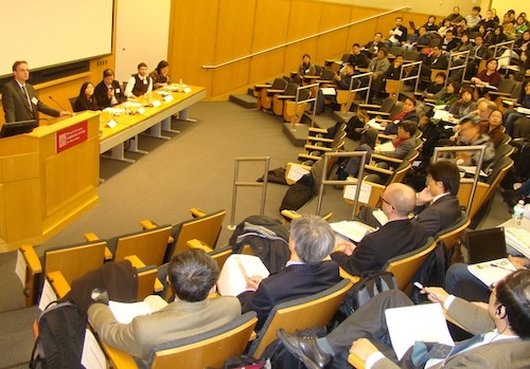
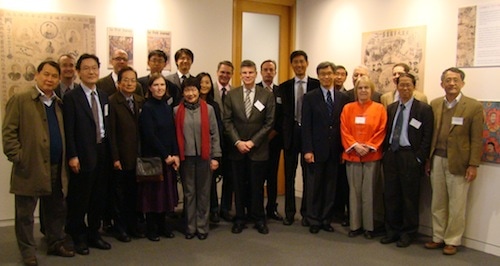
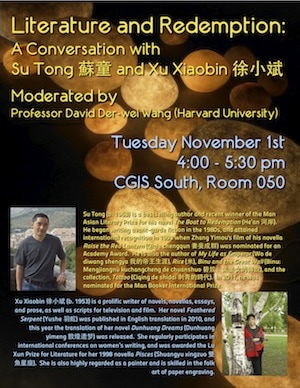
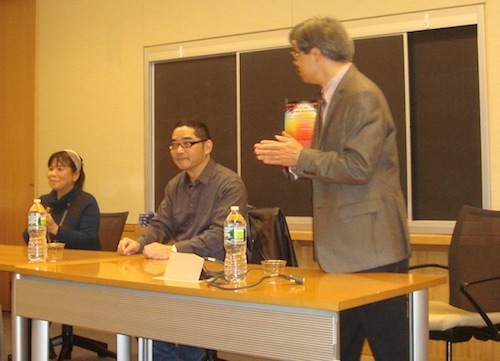
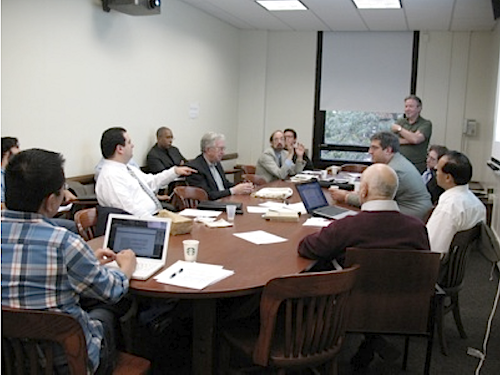
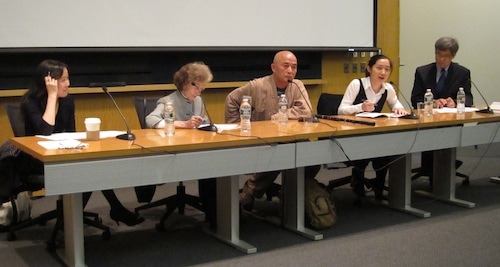
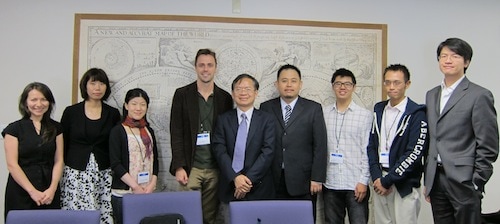
 RSS Feed
RSS Feed